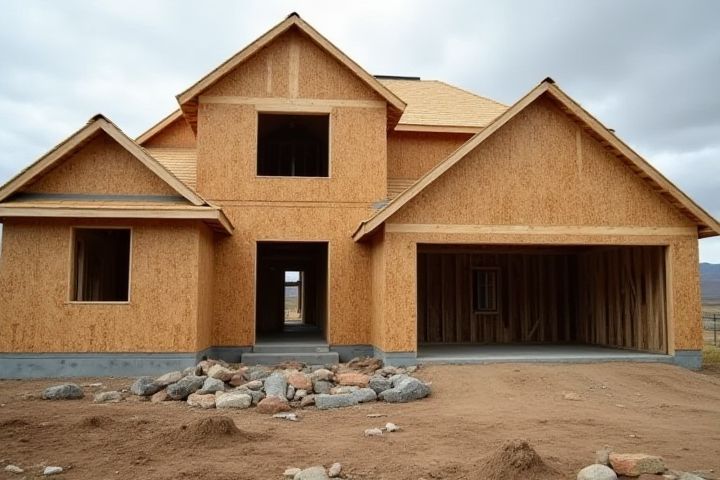
Building a house without a permit is generally illegal and can lead to severe consequences, including fines or forced demolition. Local governments require permits to ensure that constructions meet safety codes, zoning laws, and environmental regulations. Failing to obtain the necessary permits can jeopardize your investment and create issues when trying to sell the property in the future. It's essential to consult your local building department to understand specific requirements and navigational processes. Always prioritize compliance with local laws to protect your investment and community standards.
Can We Build A House Without A Permit
Legal consequences
Constructing a house without a permit can lead to severe legal consequences, including fines or penalties imposed by local authorities. Local building codes require permits to ensure safety and compliance with zoning regulations, which protect the community's integrity and welfare. If discovered, you may be required to halt construction and potentially demolish any unauthorized structures, incurring additional costs. Furthermore, lacking proper permits can complicate future transactions, such as selling the property, as buyers or lenders will often require proof of compliance with local laws.
Safety standards
Constructing a house without a permit poses significant safety risks and legal consequences. Building codes establish essential safety standards, including structural integrity, fire prevention, electrical safety, and plumbing regulations, that protect occupants and the surrounding community. Without adhering to these regulations, your home may lack critical safety features, leading to potential hazards such as fires, electrical failures, or structural collapses. Obtaining a permit ensures that trained professionals review your plans, promoting a safe living environment tailored to recognized construction standards.
Insurance voidance
Building a house without a permit may lead to significant insurance voidance issues. Insurers typically require proper permits to ensure compliance with local building codes and safety regulations. If an unpermitted structure suffers damage, your insurance claim could be denied, as the lack of permits indicates a failure to adhere to legal standards. You risk not only financial loss from potential accidents or damages but also legal ramifications, as many municipalities impose fines for construction violations.
Resale challenges
Building a house without a permit can lead to significant resale challenges, as potential buyers are often wary of properties that lack proper documentation and compliance with local building codes. This can affect the property's market value, making it less appealing compared to similar homes that are legally constructed. Additionally, you may face legal repercussions, including fines or mandated demolition, further complicating the resale process. Ultimately, not obtaining the necessary permits can result in difficulties securing financing, as lenders typically require proof of compliance before approving a mortgage.
Property value impacts
Building a house without a permit can significantly impact property value, often leading to legal complications and reduced marketability. Homes constructed without adherence to local zoning regulations may face devaluation, with prospective buyers wary of potential fines or the need for costly retrofitting. Properties lacking proper permits often trigger lower appraisals, potentially decreasing resale value by 10% to 20%. Furthermore, local authorities may impose penalties or require demolition, further diminishing the long-term investment potential of your property.
Utility access issues
Building a house without a permit can lead to significant utility access issues, as most utility providers require proof of legal construction for services like water, electricity, and gas. Many local regulations mandate that new constructions must adhere to safety codes and zoning laws, which are assessed during the permitting process. Without a permit, you may face delays or denial of service connections, impacting your ability to access essential utilities like power, heating, and sewage disposal. It's crucial to understand that unpermitted structures may also result in fines and complications when trying to connect to public utility systems.
Code compliance
Building a house without a permit can lead to significant legal repercussions, as most local jurisdictions require adherence to building codes for safety and structural integrity. Code compliance ensures that construction meets standards set for electrical systems, plumbing, and fire safety among others, protecting both the occupants and the surrounding community. Violating these codes may result in fines, mandated demolitions, and complications when trying to sell the property. Always consult your local building department to verify the necessary permits to ensure your construction project remains compliant and safe.
Local jurisdiction rules
Building a house without a permit often violates local jurisdiction rules, which can vary significantly by area. Many municipalities require specific permits to ensure compliance with safety regulations, zoning laws, and building codes, protecting both the builder and future occupants. Failure to obtain the necessary permits can lead to substantial fines, costly modifications, or even the demolition of the structure. Before starting any construction, it is crucial to consult your local building department to understand the specific requirements and avoid potential legal issues.
Contractor limitations
Building a house without a permit can severely limit contractors in their ability to work legally and safely. Contractors often face legal repercussions, including fines and potential loss of licenses, if they proceed without obtaining the necessary permits. Moreover, building without permits can result in structures that do not comply with local building codes, jeopardizing safety and future resale value. Homeowners should carefully consider the risks, as using unpermitted contractors can lead to complications when trying to secure insurance or make future improvements.
Potential fines
Building a house without a permit can lead to significant potential fines, which may range from hundreds to thousands of dollars depending on local regulations. For instance, a typical fine for unauthorized construction can be anywhere from $500 to $5,000, and this amount increases for repeat violations. In addition to financial penalties, you may also face orders to stop construction and remove any unauthorized structures, leading to more costs. To safeguard your investment and avoid unexpected expenses, secure the necessary permits before beginning any building project.
